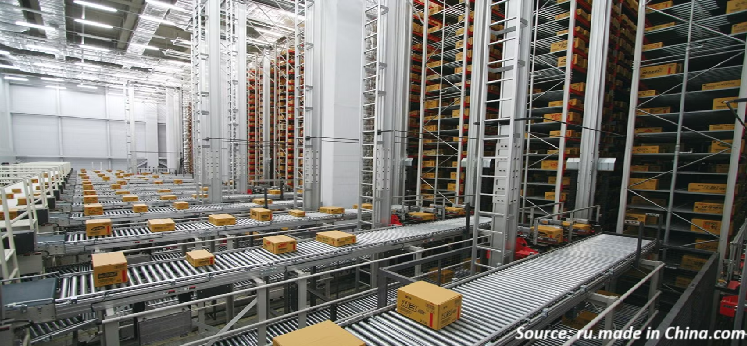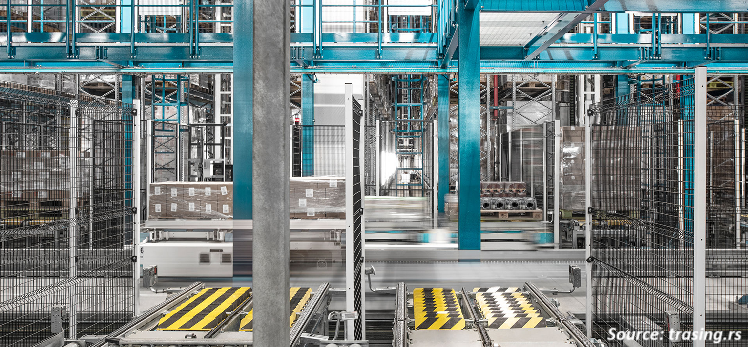
Taiwan Intralogistics Market by Component (Hardware, Software, and Services), and by End User Industry (Logistics, Food & Beverages, Retail & E-commerce, Automotive, Chemicals, Pharmaceuticals, Airport, and Mining) – Opportunity Analysis and Industry Forecast 2023–2030
Industry: Construction & Manufacturing | Publish Date: 07-Dec-2023 | No of Pages: 75 | No. of Tables: 50 | No. of Figures: 21 | Format: PDF | Report Code : N/A
Market Definition
The Taiwan Intralogistics Market was valued at USD 302.49 million in 2022, and is predicted to reach USD 956.27 million by 2030, with a CAGR of 15.3% from 2023 to 2030. Intralogistics is a vital aspect of supply chain management, and its market is focused on the design, implementation, and maintenance of internal logistics systems. To maximize the flow of materials and effectively and economically meet the company's demands, it entails the movement, storage, and management of commodities within an organization, such as a factory, warehouse, or distribution center.
The intralogistics market involves the design, implementation, and maintenance of factory and warehouse systems and includes various industries such as manufacturing, retail, e-commerce, and healthcare. Material handling, inventory control, order fulfillment, and reverse logistics are some of the most frequent applications of intralogistics. The intralogistics industry is expanding as a result of the rising need for quick and effective delivery, rising demand for automation, and rising demand for sustainable and environmentally friendly solutions.
Taiwan's Tech Mastery: Shaping the Future with Smart Machinery and Advanced Intralogistics
Taiwan's renowned status as an ICT manufacturing hub, driven by a robust industry base and cutting-edge semiconductor clusters, aligns with its ambitious goal to lead in future technologies. As leaders in smart machinery, Taiwanese manufacturers are pivotal in shaping global industrial landscapes.
The convergence of technologies such as industrial automation, collaborative robots, power presses, and high-precision cutting tools not only emphasizes innovation but also underscores the critical role of advanced intralogistics solutions. Effective material handling and logistics systems are integral to optimizing these technologies, ensuring seamless integration, and bolstering Taiwan's position as a trailblazer in the evolving landscape of smart manufacturing.
For instance, in July 2022, Swire Coca-Cola, Coca-Cola's bottling partner in Taiwan adopted an innovative warehouse management system that uses next-generation technology to enable real-time inventory data management by replacing their previous manual operation and paper-based processes to increase the efficiency of warehouse operations management.
Taiwan's Smart Manufacturing Revolution Fuels Intralogistics Innovation
In Taiwan, numerous companies are embracing smart manufacturing practices both domestically and in their offshore operations. This strategic shift towards smart manufacturing involves the integration of advanced technologies such as automation, data analytics, and the Internet of Things (IoT) to optimize production processes.
This broader adoption of smart manufacturing aligns with the growing trend in the intralogistics market, where the demand for innovative solutions, including automated material handling systems and smart warehouse technologies, is on the rise. As Taiwanese companies prioritize efficiency and technology integration in their manufacturing operations, it contributes to the overall growth and evolution of the intralogistics sector.
For example, TECO Electric & Machinery, Taiwan’s leading manufacturer of motors, runs a factory in Vietnam’s Binh Duong Province that produces small, high-efficiency motors using smart manufacturing technologies developed by the company over the past several years. Thus, it is expected to collectively fuel the market growth of intralogistics solutions in the country.
High Installation Cost of Intralogistics Systems Can Gloom the Market Prospects
The high installation cost of intralogistics systems can be a significant barrier to adoption and can limit the market prospects for these systems. Intralogistics systems typically require significant investments in technology and infrastructure, including specialized equipment, software, and hardware, as well as the cost of installation and maintenance.
Some organizations, especially small and medium-sized enterprises (SMEs), which may have limited resources to invest in these technologies, may find this high upfront cost to be prohibitive. The scale and complexity of the operation, the level of customization needed, and the level of automation requested can all have an impact on how much intralogistics systems cost. As a result, some businesses may opt for less expensive and less efficient alternatives, which can limit the growth and adoption of intralogistics systems in the market.
Unlocking Opportunities: Introduction of Drones in the Intralogistics Industry to Create Future Market Prospects
The introduction of drones in intralogistics has the potential to create significant growth opportunities for businesses that rely on efficient supply chain operations. Drones, also known as unmanned aerial vehicles (UAVs), are being used in intralogistics to automate a range of tasks, including inventory management, order picking, and delivery.
Businesses may increase the accuracy and speed of their operations while cutting the time and expense of manual labor and transportation by utilizing drone technology. Drones can also increase the flexibility and scalability of intralogistics, allowing businesses to quickly adjust to fluctuations in demand.
Moreover, drones can improve efficiency and reduce the risk of accidents or injuries for workers who might otherwise need to use ladders or other equipment to access these areas. In addition, drones can gather information on inventory levels, product quality, and other key metrics, providing businesses with valuable insights into their operations by using sensors and cameras. This data can be used to optimize processes, improve forecasting, and reduce waste, leading to cost savings and improved efficiency. All these above-mentioned factors are expected to create growth opportunities for the intralogistics market shortly.
Competitive Landscape
The Taiwan intralogistics industry includes several market players such as Daifuku Co. Ltd., Jungheinrich AG, Kion Group AG, Honeywell International Inc., Midea Group, Vanderlande Industries B.V., SSI Schaefer AG, KNAPP AG, Beumer Group Gmbh and Co. KG, and Autostore.
Key Benefits
-
The Taiwan intralogistics market report provides a quantitative analysis of the current market and estimations throughout 2023-2030 that assists in identifying the prevailing industry opportunities to capitalize on.
-
The study comprises a deep-dive analysis of the current and future market trends, depicting the prevalent investment pockets in the market.
-
The information related to key drivers, restraints, and opportunities and their impact on the market is provided in the report.
-
The competitive analysis of the market players along with their market share in the Taiwan intralogistics market.
-
The SWOT analysis and Porter’s Five Forces model are elaborated in the study.
-
Value chain analysis in the market study provides a clear picture of the stakeholders’ roles.
Taiwan Intralogistics Market Key Segments
By Component
-
Hardware
-
Automated Storage and Retrieval Systems (AS/RS)
-
Unit-Load AS/RS
-
Mini-Load AS/RS
-
Vertical Lift Modules (VLMs)
-
Carousel AS/RS
-
-
Industrial Robots
-
Mobile Robots
-
Automated Guided Vehicles (AGV)
-
Autonomous Mobile Robots (AMR)
-
-
Conveyor Systems
-
Sortation Systems
-
-
Software
-
Services
By End User Industry
-
Logistics
-
Food and Beverages
-
Retail and E-Commerce
-
Automotive
-
Chemicals
-
Pharmaceuticals
-
Airport
-
Mining
REPORT SCOPE AND SEGMENTATION:
|
Parameters |
Details |
|
Market Size in 2022 |
USD 302.49 Million |
|
Revenue Forecast in 2030 |
USD 956.27 Million |
|
Growth Rate |
CAGR of 15.3% from 2023 to 2030 |
|
Analysis Period |
2022–2030 |
|
Base Year Considered |
2022 |
|
Forecast Period |
2023–2030 |
|
Market Size Estimation |
Million (USD) |
|
Growth Factors |
The strong ICT industry base The presence of leading manufacturer. |
|
Companies Profiled |
10 |
|
Market Share |
Available for 10 companies |
|
Customization Scope |
Free customization (equivalent up to 80 working hours of analysts) after purchase. Addition or alteration to country, regional, and segment scope. |
|
Pricing and Purchase Options |
Avail customized purchase options to meet your exact research needs. |
KEY PLAYERS
-
Daifuku Co. Ltd.
-
Jungheinrich AG
-
Kion Group AG
-
Honeywell International Inc.
-
Midea Group
-
Vanderlande Industries B.V.
-
SSI Schaefer AG
-
KNAPP AG
-
Beumer Group Gmbh and Co. KG
-
Autostore

















 Speak to Our Analyst
Speak to Our Analyst





















